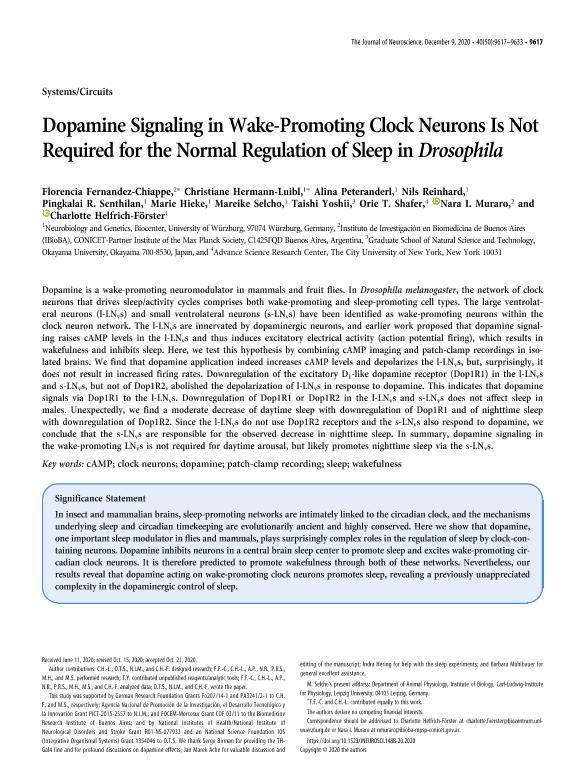Artículo
Dopamine signaling in wake-promoting clock neurons is not required for the normal regulation of sleep in drosophila
Fernández, Florencia ; Hermann Luibl, Christiane; Peteranderl, Alina; Reinhard, Nils; Senthilan, Pingkalai R.; Hieke, Marie; Selcho, Mareike; Yoshii, Taishi; Shafer, Orie T.; Muraro, Nara Ines
; Hermann Luibl, Christiane; Peteranderl, Alina; Reinhard, Nils; Senthilan, Pingkalai R.; Hieke, Marie; Selcho, Mareike; Yoshii, Taishi; Shafer, Orie T.; Muraro, Nara Ines ; Helfrich Förster, Charlotte
; Helfrich Förster, Charlotte
 ; Hermann Luibl, Christiane; Peteranderl, Alina; Reinhard, Nils; Senthilan, Pingkalai R.; Hieke, Marie; Selcho, Mareike; Yoshii, Taishi; Shafer, Orie T.; Muraro, Nara Ines
; Hermann Luibl, Christiane; Peteranderl, Alina; Reinhard, Nils; Senthilan, Pingkalai R.; Hieke, Marie; Selcho, Mareike; Yoshii, Taishi; Shafer, Orie T.; Muraro, Nara Ines ; Helfrich Förster, Charlotte
; Helfrich Förster, Charlotte
Fecha de publicación:
09/12/2020
Editorial:
Society for Neuroscience
Revista:
Journal of Neuroscience
ISSN:
0270-6474
Idioma:
Inglés
Tipo de recurso:
Artículo publicado
Clasificación temática:
Resumen
Dopamine is a wake-promoting neuromodulator in mammals and fruit flies. In Drosophila melanogaster, the network of clock neurons that drives sleep/activity cycles comprises both wake-promoting and sleep-promoting cell types. The large ventrolateral neurons (l-LNvs) and small ventrolateral neurons (s-LNvs) have been identified as wake-promoting neurons within the clock neuron network. The l-LNvs are innervated by dopaminergic neurons, and earlier work proposed that dopamine signaling raises cAMP levels in the l-LNvs and thus induces excitatory electrical activity (action potential firing), which results in wakefulness and inhibits sleep. Here, we test this hypothesis by combining cAMP imaging and patch-clamp recordings in isolated brains. We find that dopamine application indeed increases cAMP levels and depolarizes the l-LNvs, but, surprisingly, it does not result in increased firing rates. Downregulation of the excitatory D1-like dopamine receptor (Dop1R1) in the l-LNvs and s-LNvs, but not of Dop1R2, abolished the depolarization of l-LNvs in response to dopamine. This indicates that dopamine signals via Dop1R1 to the l-LNvs. Downregulation of Dop1R1 or Dop1R2 in the l-LNvs and s-LNvs does not affect sleep in males. Unexpectedly, we find a moderate decrease of daytime sleep with downregulation of Dop1R1 and of nighttime sleep with downregulation of Dop1R2. Since the l-LNvs do not use Dop1R2 receptors and the s-LNvs also respond to dopamine, we conclude that the s-LNvs are responsible for the observed decrease in nighttime sleep. In summary, dopamine signaling in the wake-promoting LNvs is not required for daytime arousal, but likely promotes nighttime sleep via the s-LNvs.
Palabras clave:
CAMP
,
CLOCK NEURONS
,
DOPAMINE
,
PATCH-CLAMP RECORDING
,
SLEEP
,
WAKEFULNESS
Archivos asociados
Licencia
Identificadores
Colecciones
Articulos(IBIOBA - MPSP)
Articulos de INST. D/INV.EN BIOMED.DE BS AS-CONICET-INST. PARTNER SOCIEDAD MAX PLANCK
Articulos de INST. D/INV.EN BIOMED.DE BS AS-CONICET-INST. PARTNER SOCIEDAD MAX PLANCK
Citación
Fernández, Florencia; Hermann Luibl, Christiane; Peteranderl, Alina; Reinhard, Nils; Senthilan, Pingkalai R.; et al.; Dopamine signaling in wake-promoting clock neurons is not required for the normal regulation of sleep in drosophila; Society for Neuroscience; Journal of Neuroscience; 40; 50; 09-12-2020; 9617-9633
Compartir
Altmétricas



